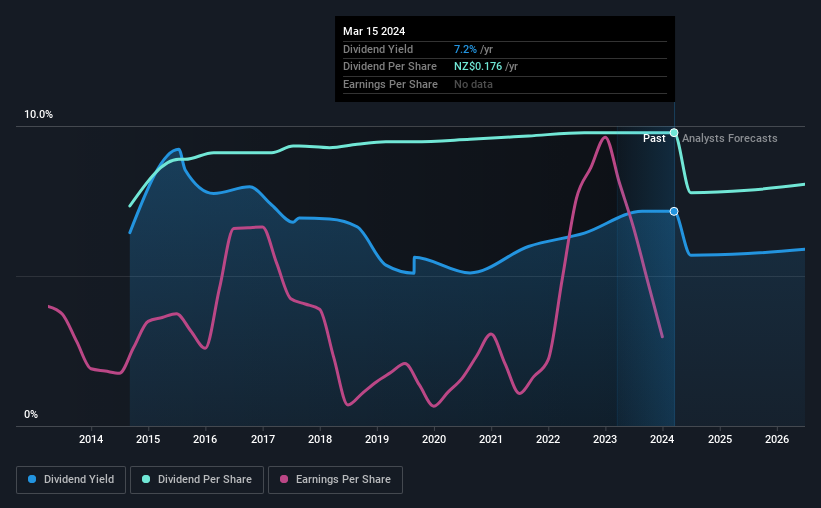Genesis Energy Limited (NZSE:GNE) Is About To Go Ex-Dividend, And It Pays A 7.2% Yield
Genesis Energy Limited (NZSE:GNE) stock is about to trade ex-dividend in four days. The ex-dividend date is one business day before a company's record date, which is the date on which the company determines which shareholders are entitled to receive a dividend. The ex-dividend date is of consequence because whenever a stock is bought or sold, the trade takes at least two business day to settle. Thus, you can purchase Genesis Energy's shares before the 20th of March in order to receive the dividend, which the company will pay on the 10th of April.
The company's next dividend payment will be NZ$0.0823529 per share, on the back of last year when the company paid a total of NZ$0.18 to shareholders. Calculating the last year's worth of payments shows that Genesis Energy has a trailing yield of 7.2% on the current share price of NZ$2.46. Dividends are an important source of income to many shareholders, but the health of the business is crucial to maintaining those dividends. So we need to investigate whether Genesis Energy can afford its dividend, and if the dividend could grow.
Check out our latest analysis for Genesis Energy
If a company pays out more in dividends than it earned, then the dividend might become unsustainable - hardly an ideal situation. Genesis Energy distributed an unsustainably high 189% of its profit as dividends to shareholders last year. Without more sustainable payment behaviour, the dividend looks precarious. Yet cash flows are even more important than profits for assessing a dividend, so we need to see if the company generated enough cash to pay its distribution. Dividends consumed 51% of the company's free cash flow last year, which is within a normal range for most dividend-paying organisations.
It's disappointing to see that the dividend was not covered by profits, but cash is more important from a dividend sustainability perspective, and Genesis Energy fortunately did generate enough cash to fund its dividend. If executives were to continue paying more in dividends than the company reported in profits, we'd view this as a warning sign. Extraordinarily few companies are capable of persistently paying a dividend that is greater than their profits.
Click here to see the company's payout ratio, plus analyst estimates of its future dividends.

Have Earnings And Dividends Been Growing?
Businesses with strong growth prospects usually make the best dividend payers, because it's easier to grow dividends when earnings per share are improving. If business enters a downturn and the dividend is cut, the company could see its value fall precipitously. It's encouraging to see Genesis Energy has grown its earnings rapidly, up 33% a year for the past five years.
Another key way to measure a company's dividend prospects is by measuring its historical rate of dividend growth. Genesis Energy has delivered an average of 2.9% per year annual increase in its dividend, based on the past 10 years of dividend payments. It's good to see both earnings and the dividend have improved - although the former has been rising much quicker than the latter, possibly due to the company reinvesting more of its profits in growth.
The Bottom Line
Has Genesis Energy got what it takes to maintain its dividend payments? Genesis Energy has been growing its earnings per share nicely, although judging by the difference between its profit and cashflow payout ratios, the company might have reported some write-offs over the last year. Overall we're not hugely bearish on the stock, but there are likely better dividend investments out there.
However if you're still interested in Genesis Energy as a potential investment, you should definitely consider some of the risks involved with Genesis Energy. For example, we've found 4 warning signs for Genesis Energy (1 is concerning!) that deserve your attention before investing in the shares.
A common investing mistake is buying the first interesting stock you see. Here you can find a full list of high-yield dividend stocks.
Have feedback on this article? Concerned about the content? Get in touch with us directly. Alternatively, email editorial-team (at) simplywallst.com.
This article by Simply Wall St is general in nature. We provide commentary based on historical data and analyst forecasts only using an unbiased methodology and our articles are not intended to be financial advice. It does not constitute a recommendation to buy or sell any stock, and does not take account of your objectives, or your financial situation. We aim to bring you long-term focused analysis driven by fundamental data. Note that our analysis may not factor in the latest price-sensitive company announcements or qualitative material. Simply Wall St has no position in any stocks mentioned.
